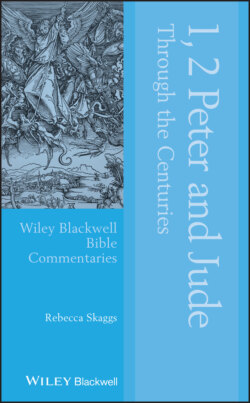Читать книгу 1, 2 Peter and Jude Through the Centuries - Rebecca Skaggs - Страница 24
Ancient Receptions
ОглавлениеSome of the fathers, among them Cyril of Alexandria (375–444), Oecumenius (d. 990), and Theophylact (c. 1050–1108, Comm. on 1 Peter), read these three prepositional phrases in v.2 as modifying “apostle,” thus substantiating the authority of Peter’s apostleship. On the other hand, Bede associates God’s foreknowledge with the recipients: “they were chosen … [so] they might be sanctified” (Comm., 1985: 70). In any case, the intriguing issue is God’s foreknowledge. Of course, the famous controversies about predestination and free will would be further developed in the later Reformation with Calvin, Arminius (1560–1609), and many others.
At an earlier time (c. 200–300), interest centered on the nature of God’s knowledge and what that meant. For example, Origen discusses this in the context of the role of the Spirit in the Trinity, especially in revelation:
We are not, however, to suppose that the Spirit derives His knowledge through revelation from the Son. For if the Holy Spirit knows the Father through the Son’s revelation, He passes from a state of ignorance into one of knowledge; but it is alike impious and foolish to confess the Holy Spirit, and yet to ascribe to Him ignorance. (Origen, 1973, 1:3–4: ccel.org)
For Didymus the Blind (313–398) foreknowledge is a matter of perspective; he comments that “foreknowledge … becomes knowledge as the things which are foreseen take place.” So, although Peter’s readers had already been chosen according to God’s foreknowledge, “by the time he was writing to them their election had already taken place” (Comm. on 1 Peter, 19–20, PG 39: 1755–1756: my tr.).
Perhaps Didymus anticipates the larger issue to come regarding predestination, since he addresses some of the problems raised later. He says that God’s sovereignty is “beautiful and comforting … being chosen relies not on our worthiness and merit … but on the hand of God and … his mercy” (Didymus: ibid.). Therefore, it is certain and cannot fail. It would seem that Bede also anticipates the later contentious issues of predetermination, when he indicates that it is a cooperative effort between us and God which brings about the reality of heaven: “No one by his own effort alone can become worthy of achieving eternal salvation by his own strength” (Comm., 72: ACC).
